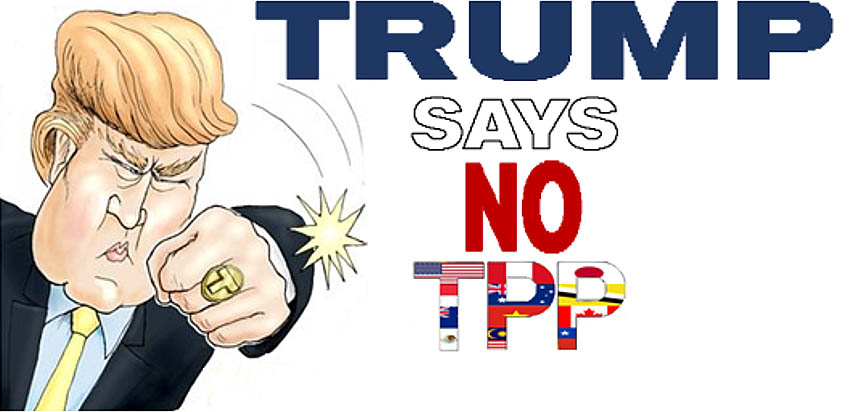
He Yafei, Former Vice Minister of Foreign Affairs
Nov 24, 2016
Globalization is always an evolving process, with inevitable ups and downs and not moving in a linear fashion. Despite populist reservations in the US and UK, the international community has become intertwined and interdependent, thanks to global free trade and investment. Cooperation to tackle global challenges will continue while more efforts will address the “global governance deficiency” in promoting social justice and fairness such the widening gap between rich and poor both domestically and among nations.

Hugh Stephens, Distinguished Fellow, Asia Pacific Foundation of Canada
Nov 18, 2016
With the election of Donald Trump to the White House, the Obama Administration has finally accepted the inevitable and has announced that it will cease efforts to push the Trans Pacific Partnership (TPP) forward in the waning days of the Lame Duck session. Over the long term, Washington will need to re-assert its trade presence in the Asia-Pacific region. The supply chains are too interwoven and interdependent for the U.S. to go at it alone, despite the isolationist rhetoric emanating from the U.S. election.
Wu Sike, Member on Foreign Affairs Committee, CPPCC
Nov 15, 2016
The fine momentum of deepening China-US cooperation in various areas will inevitably extend into the upcoming new US presidency. Donald Trump and his team, who have won the election under the banner of “Make America Great Again”, should see that joining hands with China in the Asia-Pacific will result in a win-win scenario for both counties.
Sep 20, 2016
Peru's new president said Monday it was "worrisome" that China is not part of the 12-nation Trans-Pacific Partnership but his government would seek ratification for U.S. President Barack Obama's signature trade deal.
Wu Zhenglong, Senior Research Fellow, China Foundation for International Studies
Sep 20, 2016
The TPP is an important piece of Obama’s strategy of rebalancing to the Asia-Pacific region, and also one of the most important political legacies he’s tried to build before leaving the White House. Any delay in approving the TPP will deal a heavy blow to the US rebalance to the Asia-Pacific region, but faced with the political reality of the US elections, a rethink will be in order.
Yu Xiang, Senior Fellow, China Construction Bank Research Institute
Aug 15, 2016
The economic relationship should have evolved with China and U.S. economies’ “New Normal”, but a variety of fears are in the way. The U.S. would like to decrease its reliance on consumption as the engine of growth, relying more on domestic investment and exports. China seeks more consumer spending, and less reliance on domestic investment and exports. Those goals are highly complementary and mutually reinforcing, creating opportunities that should not be missed.
Zhang Monan, Deputy Director of Institute of American and European Studies, CCIEE
Aug 08, 2016
In order to enhance global trade and value creation, reducing trade friction-induced costs should be a top priority, which will contribute to elevating GVC cooperation in Asia and at large. Measures should be taken to lower the average tariff level by paring peak tariff, and encourage further trade liberalization.
Zhang Monan, Deputy Director of Institute of American and European Studies, CCIEE
Jun 20, 2016
In the long-term, a series of regional free trade agreements and the new global rules conform to China’s own economic restructuring and reform direction. China must enhance its level of liberalization in such areas as goods trade, service trade and investment, break through market barriers and get rid of institutional barriers. Making use of an open competition will promote the country’s upgrading in the global value chain.
Han Liqun, Researcher, China Institutes of Contemporary International Relations
Jun 02, 2016
Ultimately, the regional order is shaped by economic relations. The current cooperation structure accommodates the interests and comfort levels of multiple parties, and opens up new space for compromise and dynamic balance through mutual adaptation and acceptance. China has gained invaluable experience in neighborhood diplomacy, and the country’s neighbors have gradually gotten used to China's rise.
May 03, 2016
Let’s seize this opportunity, pass the Trans-Pacific Partnership and make sure America isn’t holding the bag, but holding the pen.
Back to Top

- China-US Focus builds trust and understanding between the U.S. and China through open dialogue among thought leaders.
- Our Offerings
- Topics
- Videos
- Podcasts
- Columnists
- Research Reports
- Focus Digest
- Stay Connected
-
Thanks for signing up!
- Get the latest stories from China-US Focus weekly.